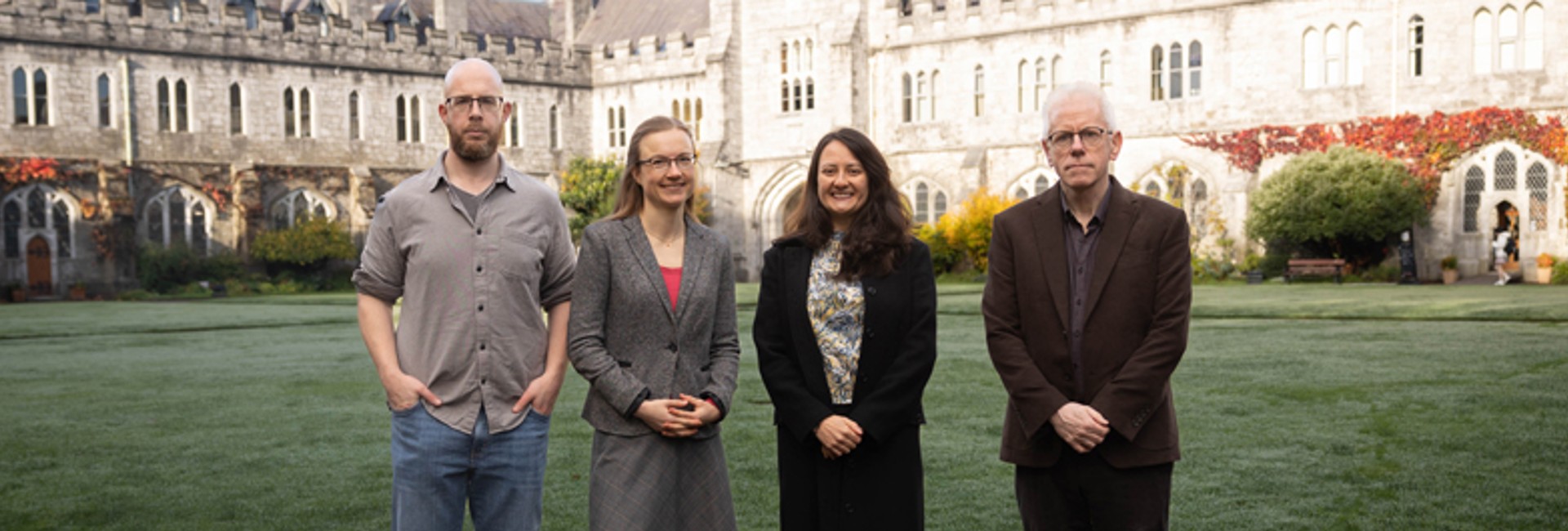In This Section

- Four UCC researchers in total awarded a combined €1.725 million funding in SFI-IRC Pathway programme awards.
- Funding to CACSSS researchers will support the development of a model to reduce weather-related risks caused by climate change and a child-centered exploration of the worlds of children of deaf adults (CODA).
A CACSSS researcher has received funding to develop a model aimed at assisting vulnerable urban dwellings and communities during extreme weather-related events caused by climate change.
Dr Camila Tavares Pereira, based in the Department of Geography and MaREI, the world leading SFI Research Centre for Energy, Climate and Marine, has received €434,258 in research funding for her project which will establish a transferable and community-based Climate Change Risk Assessment (CCRA) model for dwellings in the Global South (GS), and transfer the GS knowledge to community-based measures in Ireland.
The TRIS (Transferability of Resilience in Informal Settlements) project will use diverse methodology such as fieldwork, interviews, workshops and remote sensing to reduce exposure and vulnerability to climate related extreme events, and enhance community led measures to upgrade dwellings in high-risk areas.
"This project will work with communities in the Global South, initially in Brazil, that are suffering from different climate-related hazards, such as flooding and landslides, address the components of climate risk such as threat, exposure, and vulnerability, and study the measures and actions taken by these communities to reduce the risk caused by climate change at a local and national level," said Dr Camila Tavares Pereira.
"The aim is that our climate risk assessment model can be implanted in communities throughout Ireland. As we have seen in recent weeks in Cork and in other parts of the country, the impact of extreme climate change-related events such as flooding can be long lasting and life-changing for the communities they impact," said Dr Camila Tavares Pereira.
Dr Noel O’Connell, (Institute for Social Science in the 21st Century - ISS21) and the School of Applied Social Sciences was awarded €435,879 for the project CODA: A Hidden Minority Amongst the Majority. The CODA project will explore the ways in which children of deaf adults negotiate their social identities. Over 90% of children born to deaf adults can hear. CODA will study the effect of deafness stigma associated with children of deaf parents as it remains unclear the degree to which courtesy stigma or stigma by association impacts on these childrens’ lives. The CODA project will examine this unexplored question using child-centred methodologies.
The funding has come via the SFI-IRC Pathway programme, a collaborative initiative between Science Foundation Ireland (SFI) and the Irish Research Council (IRC) to support early career research across all disciplines and to encourage interdisciplinary approaches. The awards will enable postdoctoral researchers to conduct independent research for a four–year period and will provide funding for a postgraduate student who will be primarily supervised by the awardee.
Four post-doctoral researchers in UCC have received a total of €1.725 million in funding to investigate and find solutions for STEM (Science, Technology, Engineering, Mathematics) and AHSS (Arts, Humanities, Social Sciences) related challenges under the SFI-IRC Pathway programme.
Their projects will optimise remediation of high-nutrient wastewaters derived from the agri-food sector, investigate whether oxytocin produced in the gastrointestinal tract has the potential to be a novel therapeutic target for the treatment of autism spectrum disorder (ASD) and study the effect of deafness stigma associated with children of deaf parents.
The other funded UCC postdoctoral researchers are:
Dr Neil Coughlan, School of Biological, Earth and Environmental Sciences: Azbio - Sustainable valorisation of agri-food wastewaters.
Dr Friederike Uhlig, APC Microbiome Ireland: GO-AHEAD - Gastrointestinal Oxytocin is importAnt in HEalth And Disease.
Congratulating the four recipients from University College Cork on their awards, Professor John F. Cryan, UCC Vice President for Research and Innovation said: "Congratulations to these early-career researchers in receiving SFI-IRC Pathway awards, in key areas which will address critical scientific, health, and social challenges and create a sustainable future for all. The awards will provide important support to these emerging researchers, enabling them to develop their track record and transition to become independent research leaders."
College of Arts, Celtic Studies & Social Sciences
Coláiste na nEalaíon, an Léinn Cheiltigh agus na nEolaíochtaí Sóisialta
Contact us
College Office, Room G31 ,Ground Floor, Block B, O'Rahilly Building, UCC
